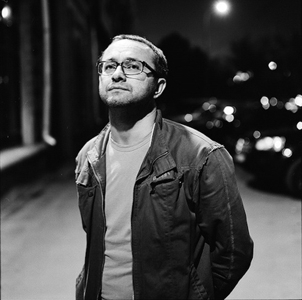The Banishment: Movie Review
11/05/2008
Izgnanie should become a watchword for the Russian-ness of things. Long, resonant, soulful, gloomy and epic Andrei Zvyagintsev’s The Banishment is nothing less than extraordinary but, at the same time, it is occasionally infuriating, stereotyped, laughable, too bleak, too hopeless and maddeningly dense. It starts with a distinctive, beautiful and, at the same time, self-consciously studied opening shot: a long, almost overly lingering shot of a windswept hillside. After what seems like ages the camera pans sl-o-o-o-owly in and round until we pick up a car’s dust trail. Then we follow the car, going at quite a rate (and, ironically, the only instance of speed or movement in the entire 2 hours and 40 minutes) through the countryside, into an urban area, then a massive grey industrial city, then to a house. We realise the driver, Mark (Aleksandr Baluyev), is injured and bleeding heavily. The house he arrives at is his brother’s, Alex (Konstantin Lavronenko), who dresses the wound.
From this considered yet startling opening we pan back slowly again, and return to the countryside. Now, we are with Alex and his glacially beautiful wife Vera (Maria Bonnevie), and their two kids. Why are they here? Is this the banishment of the title? Is Mark a shadowy character, and because of his help, Alex must lay low? Who knows. This is never explained, and seems unlikely as Mark returns to the city and Alex and family adapt to their new surroundings (the old family house we later discover) with relative ease.
The countryside to which they have travelled is glorious. Zvyagintsev captures the rolling fields in that painter’s light the way that Terrence Malick caught the Alberta cornfields in Days of Heaven.

The trees and grass and rocks and leaves sing with an intense reality that makes you think you’re actually there. There’s one moment where the family are trooping up to a small copse on a hilltop and the wind rustles the leaves that just perfectly captures the sheer wonder of being outside on a heaven-sent day.
And there are masses of this. The Banishment is a film that takes its time. Oh Lordy, does it take its time.
But the plot does come out, and it is inexorably and studiedly devastating. Sat on the porch of the dacha in the twilight, Vera tells Alex that she is expecting a child, and that it is not his. His reaction is one of despair, obviously, but like every other part of this film it is the careful and considered management of response that colours the rest of the film. Alex makes a decision about what Vera should do (or, that is to say, what he will do for her) that sets in motion a dark and tragic chain of events which take forever to unfold, but which gradually grind the audience down into a despairing yet hypnotic sense of inevitability. The central terror of the events that unfold is played out, you guessed it, slowly, without histrionics or cheap thrills or shocks, but it is deeply deeply affecting.
As the central act closes, and an extended loopback to the beginning starts, telling the story from a different angle, a gruesomely ironic revelation twists the whole thing around and finally closes the story out with a drip-drip-drip realisation of what true spiritual and emotional banishment really means.
I wish more movies would take their time, and use the silence to the same effect that Zvyagintsev manages here. There are so many places where more words could have been used, but where the silence does a far better job. However, so many elements are not explored, and a bit more colour on the mystery of Mark – for instance – would have been very welcome. Similarly, the space and light on show here with the wonderful outside shots indicate a true cinematic eye at work, but…
…and I hate to say this, although it is genuinely gripping The Banishment is just a little too long. Even bringing it in at under 2 and a half hours would have helped, and although I was delighted to see someone take their time to tell a tale of destructive estrangement, I would have to confess that for this punter at least they may have taken just a little too much (of my) time.
Visually, and emotionally, this is a stunning piece of work, but you may just want to take a cushion with you.
Soak it in, though, you’ll not see a more beautiful movie all year, and the only special effect is natural light.
